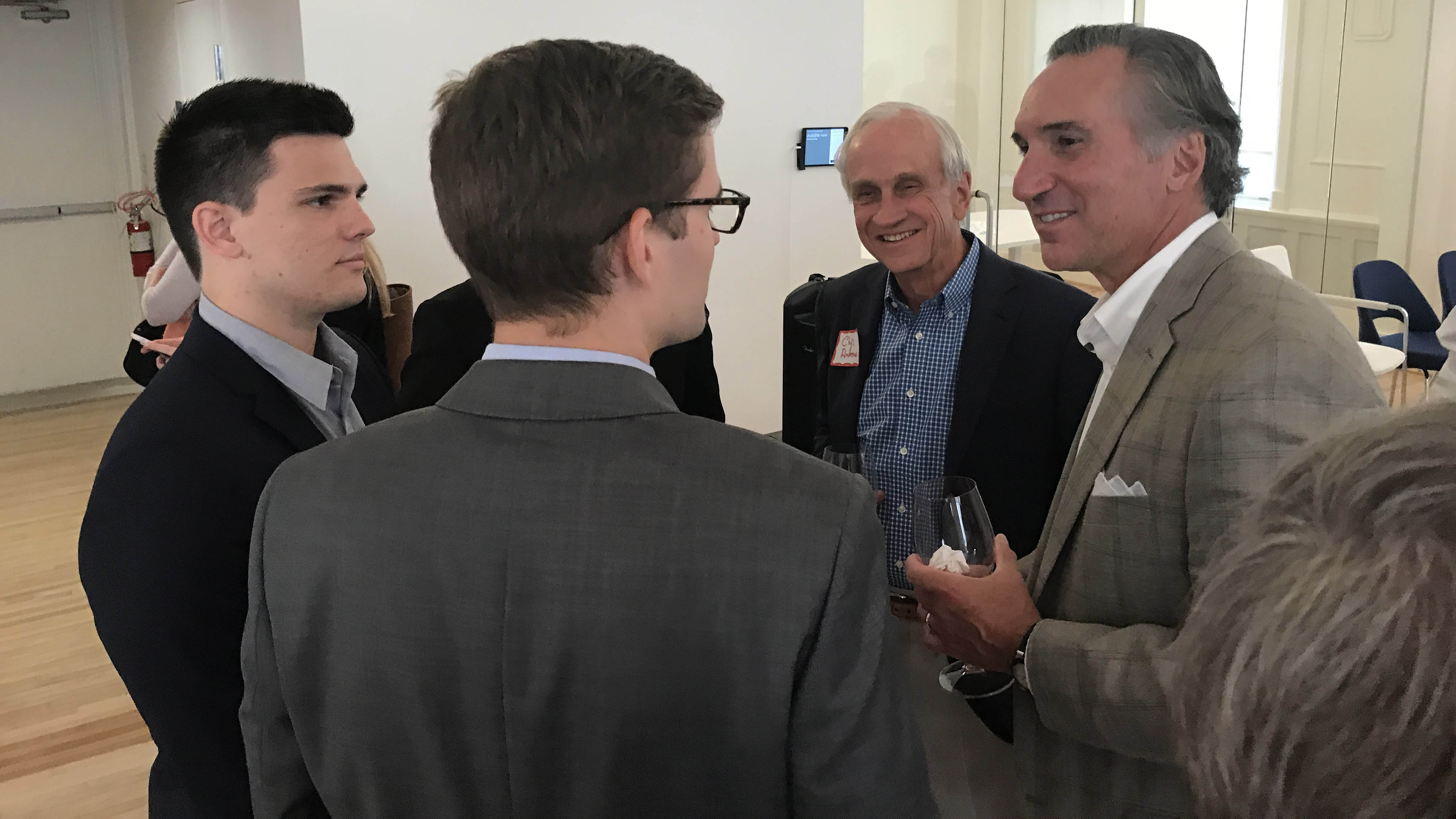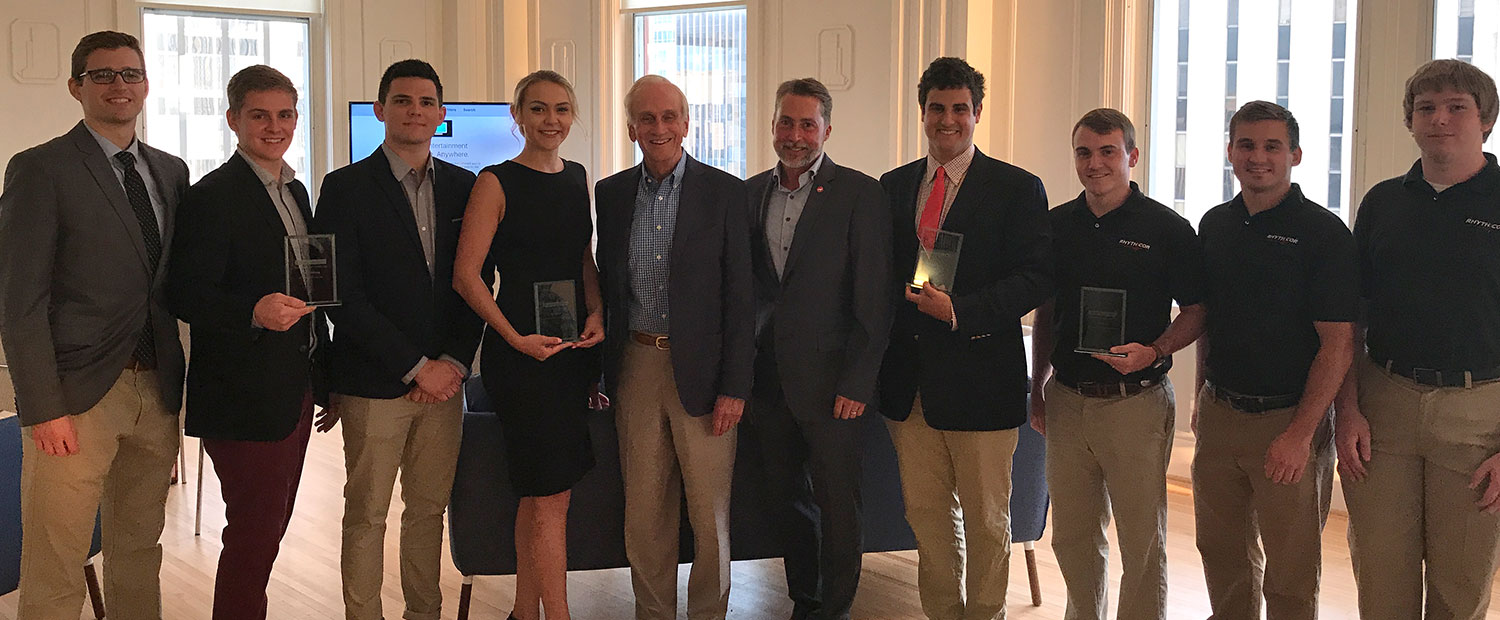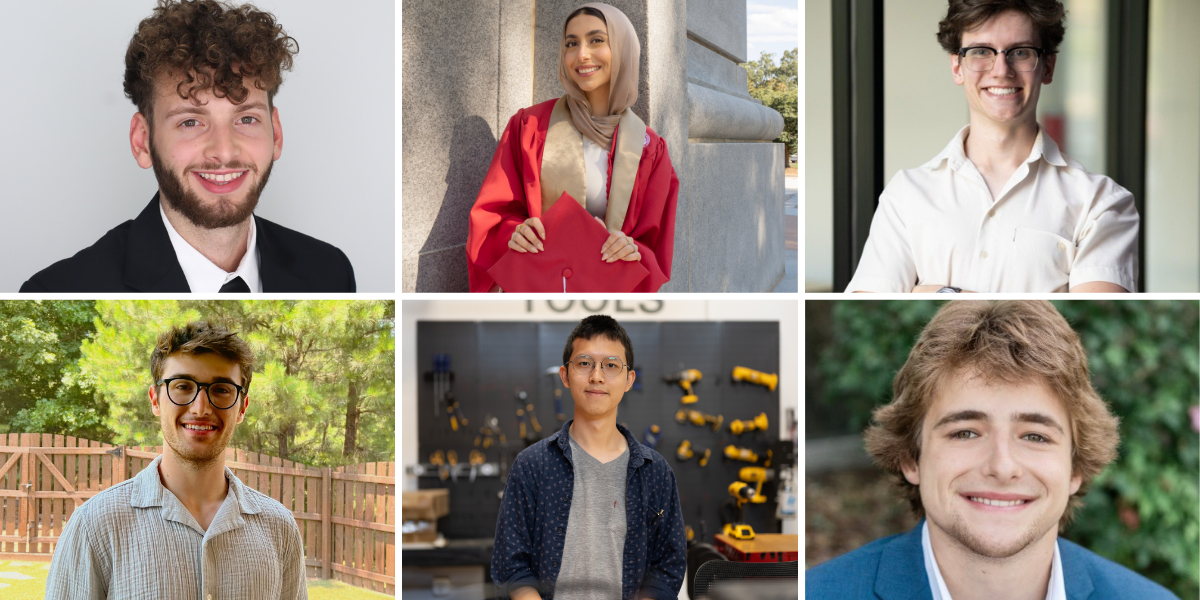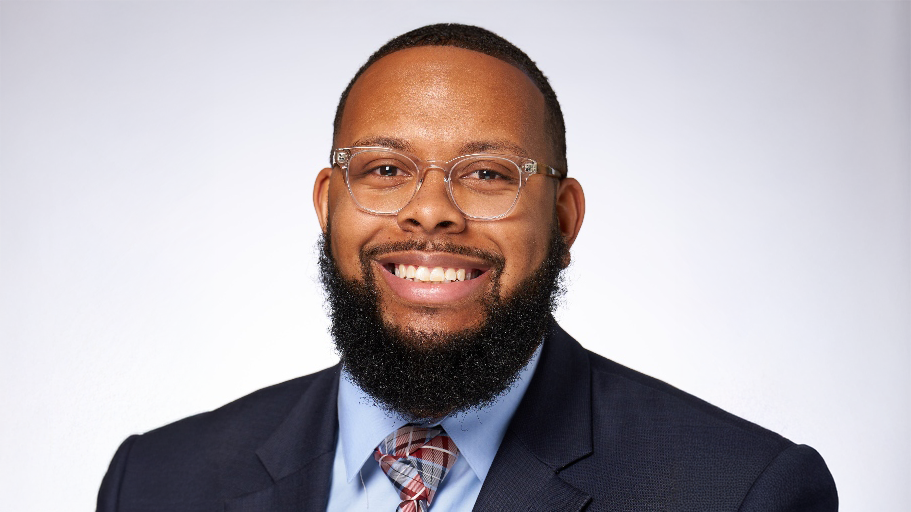NC State Student Entrepreneurs “Gain a Lot” from Andrews Launch Accelerator Experience

For three months this summer, four teams of NC State students and recent graduates participated as the second cohort in the Andrews Launch Accelerator, created to help select NC State University students advance toward entrepreneurial success.
“We had a fantastic Accelerator cohort this summer, with each team showing substantial, impressive growth in the course of the program,” said Lewis Sheats, associate professor of practice at Poole College and executive director of the NC State Entrepreneurship Clinic and manager of the Accelerator program. “The uniqueness of the Accelerator is the level of customization we can provide each team, with an in-depth dive into their specific needs,” he said. Sheats also is assistant vice provost for entrepreneurship at NC State University.

On August 23, at a private pitch night for their mentors and about 40 special guests at the HQ Capital Club in downtown Raleigh, members of the four 2017 Andrews Launch Accelerator teams reported on their progress. They later responded to an email interview with Poole College communications about their team and individual experiences.
Read their stories: Simplifeye Cosmetics | Kast Clothing | Rhythcor | AssureWear
Simplifeye Cosmetics
Cortney Cox, founder and chief executive officer of Simplifeye Cosmetics, said connecting with her mentor, Barbara Mulkey, director of the Shelton Leadership Center at NC State, and the area’s entrepreneurship community was a key takeaway for her.
“One of the most rewarding experiences was at the end of the Accelerator program when we pitched our companies to a room full of experienced entrepreneurs, investors, and professionals. My professional network has expanded tremendously and I was able to meet many people I would have never had the opportunity to meet,” Cox said.
“Also, I was paired with a mentor who has not only been an amazing advisor and mentor, but also an inspiration. I am honored to have such a strong female mentor, who has been so successful personally and professionally, to look up to.” Cox, who graduated in May with a bachelor’s in business administration and a concentration in entrepreneurship, said she is launching a crowdfunding campaign in September, raising funds and allowing her to start taking pre-orders.
Once her initial product, Simplifeye, has launched, Cox said, “we will be looking to grow our team and expand our product line.” Her business began with a product that simplifies the application of eye liner in the popular cat-eye style, because she wanted to find a less time-consuming way to do that, for herself and other women. Her ultimate goal with her business is to empower women.
On a personal level, Cox said, “I’ve grown a lot as an entrepreneur and leader. Since graduation, my business strategy and analytical skills have developed more, as I have been focusing on launching full time.” That preparation has included finding and negotiating with a manufacturer, developing her website, launching a social media campaign on Instagram – you can follow her company @iamsimpilfeye – and creating her crowdfunding campaign through iFundWomen.
Kast Clothing
Samuel Eddy, co-founder of Kast Clothing, and Luke Smith, lead engineer, also plan to continue with their start-up, although with a different approach that evolved in the course of their Accelerator experience.
Initially, Eddy said, “We were making custom-fit jeans from 3-D body scans. People have built scanners before. Our innovation was in how we generated the patterns for the jeans that would be cut by a manufacturer.” The Kast team, all recent graduates or continuing students in computer, electrical or mechanical engineering at NC State, had built a turntable scanner and connected it to a laptop, which was running software that generated an avatar. They initially had planned to generate the pattern for the custom-fit jeans from the avatar.
“We are now doing something different that doesn’t involve manufacturing or scanning, but still solves the same customer problem of finding jeans that fit,” he said.
Luke Smith cited three key ways that the Accelerator helped his team as it pivoted its focus.
Mentorship by their executive in residence, Jason Mueller, and Sheats, “provided invaluable guidance for the team,” Smith said. “Specifically, their insight helped Kast pivot from a tough-to-scale B2C model to a clunky B2B service model, and finally, “to what we believe is a scalable mixed B2B/B2C model. Additionally, their experience in growing and operating successful companies helped us with goal setting, planning and execution.”
Working with other Accelerator teams in the clinic setting was also a plus. “Critique from each of the teams has been implemented in many different ways,” he said.
The program also provided valuable connections. That included a chance to meet Chip Andrews, who, Smith said, “not only provided great feedback on our concepts, but also introduced us to the North Hills realty team. Through this connection, we were able to secure a spot in the North Hills Pop-up Program. We also were able to speak with a patent lawyer who cleared up some misunderstandings about the patent process, opening more IP opportunities.”
On a personal level, Smith said, “The Accelerator has built my ability to organize a team and evaluate ideas as business opportunities, as opposed to just technical projects. Because of this, I believe my ability to build a successful venture has tremendously improved.”
Rhythcor
Travis Murray, also a May 2017 graduate with bachelors’ degrees in electrical engineering and computer engineering, was team leader and main representative of Rhythcor during the team’s Accelerator experience. Their product is a heart monitor embedded in a garment that can help track potential for heart attacks among firefighters.
“Rhythcor has gained a lot throughout the accelerator,” Murray said. “We were able to make connections with people who can help us get through some of the challenges we will face in the future. We also spoke with many firefighters who were able to validate a need for our product and an interest to purchase.”
Murray said that he “personally learned a lot about being an entrepreneur and running a business through the Accelerator. I understand the importance of knowing your customer and catering to their needs because ultimately, that’s what we’re here for.”
He plans to continue to work for Rhythcor full time. Team members Jack Dodd and Tyler Murray will work on the team part-time while finishing their last year of college and then plan to join the startup full time, Murray said.
AssureWear
Not every business idea continues to the start-up stage, and that was the case with the AssureWear team, which initially planned to develop wearable personal safety products.
“Through the Accelerator, we conducted an in-depth analysis of the personal safety market and realized that our original product/service was not a viable solution to the initial problem, said Stephen Scheuerle, one of the AssureWear team members. “I personally gained experience in efficient customer discovery, entrepreneurial mindset, and overall communication between team members and mentors.” A senior in the College of Engineering, Scheuerle said his plans include graduate school, “with hopes of starting a business in the astronautical engineering discipline.”
David Tillack, who served as chief executive officer of the team and also is a senior in the College of Engineering, said, “We gained a lot from the Andrews Accelerator but probably most prominently were the following.
- “We learned how to conduct customer discovery properly, which doesn’t sound very hard to do but trust us – it is!
- “We learned how to go about the process of quick ideation and product sprints as well as to distinguish the difference quickly between what it means to be an inventor and what it means to be an entrepreneur.
- “As individuals,” he said, “the team learned a lot this summer about ourselves, our limits, teamwork and what it truly means to be an entrepreneur.
“We learned all of that because of the Accelerator program’s ability to really immerse you into a full hands-on learning experience. By the end of the Accelerator, it becomes quickly evident what it will take to truly be successful and as such, the AssureWear team cannot be more thankful for the opportunity we had this summer.”
Among those listening at the Accelerator’s Pitch Night was Chip Andrews, who with his wife, Lyn, in 2016 had made a gift to NC State University that established the NC State Acceleration Fund which provides seed money and other resources for the young entrepreneurs selected for the Andrews Launch Accelerator experience.
Andrews became familiar with Poole College, he wrote in an email interview with Poole College communications, while serving on the college’s Advisory Board. During that time, he said, “I had a chance to see numerous terrific programs that were making excellent progress. Over several years, one initiative stood out for me. The Management, Innovation and Entrepreneurship Department was creating new and exciting student opportunities. I had a chance to meet Lewis Sheats who was opening the Entrepreneurship Clinic in downtown Raleigh. In a university overhead-challenged environment, just getting funding for an off-campus lease was a big deal.”
“The financial commitment which Lyn and I made to start the NC State Acceleration Fund and my time with the Accelerator is based on efforts to fill the gap between the great new student ideas and the realities of starting a business,” Andrews said. “There are numerous student creative business concepts every year. Some will never be viable. Others could be great bootstrap startups or investment grade new ventures. We hope to provide some modest funding and mentor support to improve the odds of good business decisions and implementation.”
“We are very proud of the commitment from these young entrepreneurs,” Sheats said. “The Accelerator is an intense three months of development and advancement. In this fast-paced schedule, they continued to hit expected milestones and continue to position themselves for success.”
Three of the teams received funding and mentorship through the NC State Acceleration Fund & Andrews Launch Accelerator; the Kast Clothing team received mentorship support through the Accelerator.
Read more about the teams in this initial story and about their mentors here.


